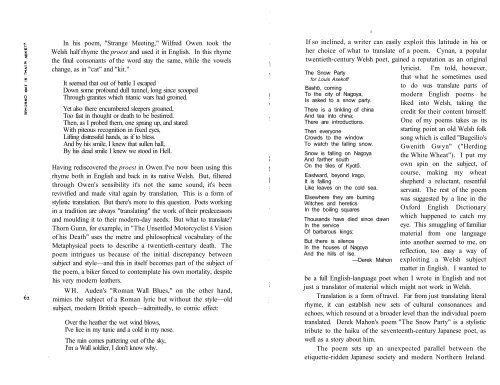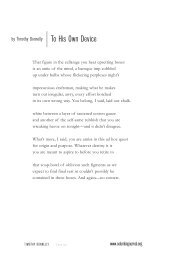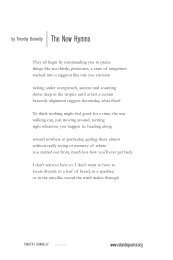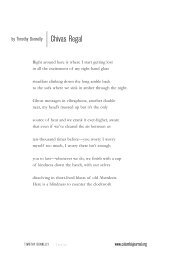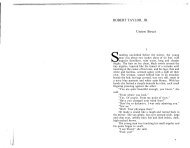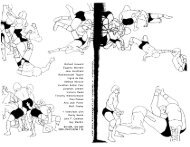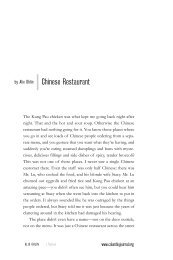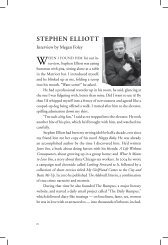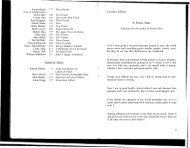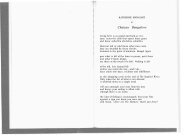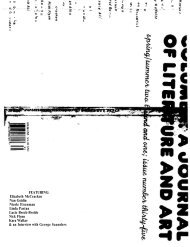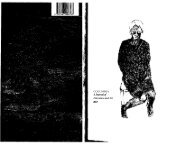Issue 27 - Columbia: A Journal of Literature and Art
Issue 27 - Columbia: A Journal of Literature and Art
Issue 27 - Columbia: A Journal of Literature and Art
Create successful ePaper yourself
Turn your PDF publications into a flip-book with our unique Google optimized e-Paper software.
o <<br />
s<br />
0<br />
o<br />
In his poem, "Strange Meeting," Wilfred Owen took the<br />
Welsh half rhyme the proest <strong>and</strong> used it in English. In this rhyme<br />
the final consonants <strong>of</strong> the word stay the same, while the vowels<br />
change, as in "cat" <strong>and</strong> "kit."<br />
It seemed that out <strong>of</strong> battle I escaped<br />
Down some pr<strong>of</strong>ound dull tunnel, long since scooped<br />
Through granites which titanic wars had groined.<br />
Yet also there encumbered sleepers groaned,<br />
Too fast in thought or death to be bestirred.<br />
Then, as I probed them, one sprang up, <strong>and</strong> stared<br />
With piteous recognition in fixed eyes,<br />
Lifting distressful h<strong>and</strong>s, as if to bless.<br />
And by his smile, I knew that sullen hall,<br />
By his dead smile I knew we stood in Hell.<br />
Having rediscovered the proest in Owen I've now been using this<br />
rhyme both in English <strong>and</strong> back in its native Welsh. But, filtered<br />
through Owen's sensibility it's not the same sound, it's been<br />
revivified <strong>and</strong> made vital again by translation. This is a form <strong>of</strong><br />
stylistic translation. But there's more to this question. Poets working<br />
in a tradition are always "translating" the work <strong>of</strong> their predecessors<br />
<strong>and</strong> moulding it to their modern-day needs. But what to translate?<br />
Thorn Gunn, for example, in "The Unsettled Motorcyclist s Vision<br />
<strong>of</strong> his Death" uses the metre <strong>and</strong> philosophical vocabulary <strong>of</strong> the<br />
Metaphysical poets to describe a twentieth-century death. The<br />
poem intrigues us because <strong>of</strong> the initial discrepancy between<br />
subject <strong>and</strong> style—<strong>and</strong> this in itself becomes part <strong>of</strong> the subject <strong>of</strong><br />
the poem, a biker forced to contemplate his own mortality, despite<br />
his very modern leathers.<br />
WH. Auden's "Roman Wall Blues," on the other h<strong>and</strong>,<br />
mimics the subject <strong>of</strong> a Roman lyric but without the style—old<br />
subject, modern British speech—admittedly, to comic effect:<br />
Over the heather the wet wind blows,<br />
I've lice in my tunic <strong>and</strong> a cold in my nose.<br />
The rain comes pattering out <strong>of</strong> the sky,<br />
I'm a Wall soldier, I don't know why.<br />
If so inclined, a writer can easily exploit this latitude in his or<br />
her choice <strong>of</strong> what to translate <strong>of</strong> a poem. Cynan, a popular<br />
twentieth-century Welsh poet, gained a reputation as an original<br />
The Snow Party<br />
for Louis Asek<strong>of</strong>f<br />
Basho, coming<br />
To the city <strong>of</strong> Nagoya,<br />
Is asked to a snow party.<br />
There is a tinkling <strong>of</strong> china<br />
And tea into china;<br />
There are introductions.<br />
Then everyone<br />
Crowds to the window<br />
To watch the falling snow.<br />
Snow is falling on Nagoya<br />
And farther south<br />
On the tiles <strong>of</strong> Kyoto.<br />
Eastward, beyond Irago,<br />
It is falling<br />
Like leaves on the cold sea.<br />
Elsewhere they are burning<br />
Witches <strong>and</strong> heretics<br />
In the boiling squares<br />
Thous<strong>and</strong>s have died since dawn<br />
In the service<br />
Of barbarous kings;<br />
But there is silence<br />
In the houses <strong>of</strong> Nagoya<br />
And the hills <strong>of</strong> Ise.<br />
—Derek Mahon<br />
lyricist. I'm told, however,<br />
that what he sometimes used<br />
to do was translate parts <strong>of</strong><br />
modern English poems he<br />
liked into Welsh, taking the<br />
credit for their content himself.<br />
One <strong>of</strong> my poems takes as its<br />
starting point an old Welsh folk<br />
song which is called "Bugeilio's<br />
Gwenith Gwyn" ("Herding<br />
the White Wheat"). I put my<br />
own spin on the subject, <strong>of</strong><br />
course, making my wheat<br />
shepherd a reluctant, resentful<br />
servant. The rest <strong>of</strong> the poem<br />
was suggested by a line in the<br />
Oxford English Dictionary<br />
which happened to catch my<br />
eye. This smuggling <strong>of</strong> familiar<br />
material from one language<br />
into another seemed to me, on<br />
reflection, too easy a way <strong>of</strong><br />
exploiting a Welsh subject<br />
matter in English. I wanted to<br />
be a full English-language poet when I wrote in English <strong>and</strong> not<br />
just a translator <strong>of</strong> material which might not work in Welsh.<br />
Translation is a form <strong>of</strong> travel. Far from just translating literal<br />
rhyme, it can establish new sets <strong>of</strong> cultural consonances <strong>and</strong><br />
echoes, which resound at a broader level than the individual poem<br />
translated. Derek Mahon's poem "The Snow Party" is a stylistic<br />
tribute to the haiku <strong>of</strong> the seventeenth-century Japanese poet, as<br />
well as a story about him.<br />
The poem sets up an unexpected parallel between the<br />
etiquette-ridden Japanese society <strong>and</strong> modern Northern Irel<strong>and</strong>.


